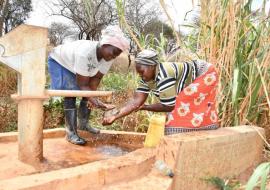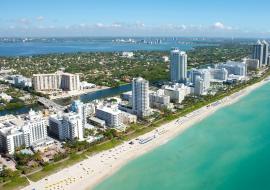Environmental Expert Advocates Policy Resolutions to Protect Caribbean Tourism
The Caribbean region must adopt aggressive local and regional environmental policies in order to protect itself from the potential impact of climate change on coastal tourism, an international expert on sustainable development and climate change has warned.
However, decision makers must first get a grasp of the region’s vulnerabilities and ability to adapt in order to develop appropriate policies, Dr. Murray Simpson, senior research associate for Oxford University Center for the Environment, has suggested.
Simpson will offer an overview of the implications of global environmental change for Caribbean coastal tourism destinations during a special panel on April 29 at the 10th Annual Caribbean Conference on Sustainable Tourism Development. He will address the resilience of these destinations in the face of a wide range of impacts, and the possible implications of climate policy in the Caribbean’s source markets.
Rising sea levels, increasing water temperatures and amplified hurricane intensity are examples of climate change challenges facing the Caribbean region, he said. They represent a major risk to the agriculture, energy and tourism sectors in the Caribbean and affect both the economic development and social welfare of Caribbean coastal communities.
“The coastal tourism segment of the industry in the Caribbean is one of the most climate and environment-dependent, and is inextricably linked to socio-economic development, sustainable livelihoods and environment protection,” said Dr. Simpson, in a preview of his presentation.
Simpson suggests that action need to be taken to address the challenges facing the Caribbean’s coastal communities.
“National and local policies need to be implemented to create a carbon neutral region and increase levels of mitigation,” Simpson explained.
As part of his presentation, Simpson plans to suggest national and local environmental policies that can be implemented. He also will explain the steps needed to recognize the resilience of coastal communities.
“The first step to understanding the Caribbean’s resilience is to understand its vulnerability and its adaptive capacity. It is important to understand these terms and to continue to raise awareness for the environmental implications for Caribbean coastal tourism destinations.”
Simpson has worked in both the public and private sectors of the tourism industry and is able to bridge the gap between research, policy and implementation. He has experience in sustainable tourism development for the Caribbean, tourism strategy, climate change adaptation and mitigation projects in small island states.
Dr. Simpson is a founding member of the UK International Human Dimensions Program on Global Environmental Change, a founding member of Experts in Climate Change and Tourism (eCLAT) and a member of the United Nations World Tourism Organization Panel of Tourism Experts.
The 10th Annual Caribbean Conference on Sustainable Tourism Development, organized by the Caribbean Tourism Organization (CTO) in collaboration with the Turks & Caicos Tourist Board and the Caribbean Hotel Association (CHA), will be held from April 28 to May 1, 2008.
Designed to provide information on the development and implementation of responsible tourism, the conference will be attended by media, travel agents and key members of the Caribbean tourism industry.














